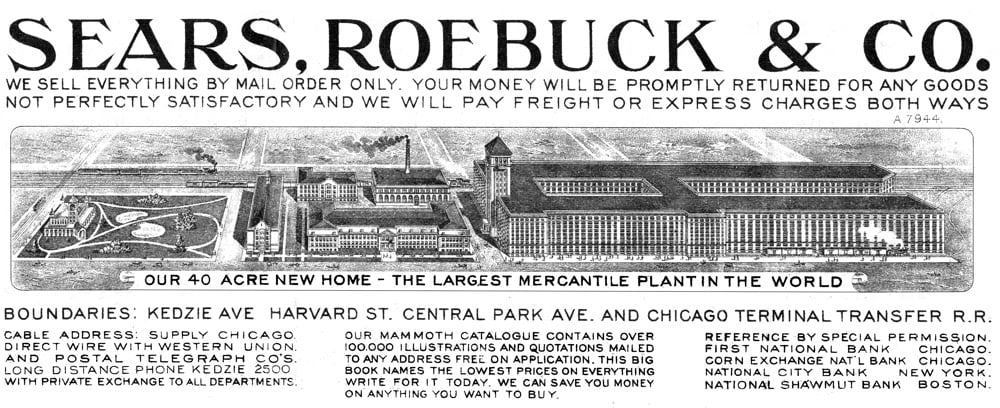How the Sears Catalog Undermined White Supremacy in the Jim Crow South

Sears has filed for bankruptcy protection and plans to close hundreds of stores in an effort to keep the company afloat. The Sears catalog is perhaps one of the most important and under-appreciated innovations in American life. Starting in 1888 with a mailer advertising watches and jewelry, Sears introduced millions of Americans to in-home shopping by using the growing networks of the railroad and US Postal Service, much like Amazon and other retailers would using the internet decades later.
The time was right for mail order merchandise. Fueled by the Homestead Act of 1862, America’s westward expansion followed the growth of the railroads. The postal system aided the mail order business by permitting the classification of mail order publications as aids in the dissemination of knowledge entitling these catalogs the postage rate of one cent per pound. The advent of Rural Free Delivery in 1896 also made distribution of the catalog economical.
As historian Louis Hyman explained on Twitter, the way Sears sold goods to their customers also provided new opportunities for black Southerners living under the Jim Crow system.
Every time a black southerner went to the local store they were confronted with forced deference to white customers who would be served first. The stores were not self-service, so the black customers would have to wait. And then would have to ask the proprietor to give them goods (often on credit because…sharecropping). The landlord often owned the store. In every way shopping reinforced hierarchy. Until Sears.
The catalog undid the power of the storekeeper, and by extension the landlord. Black families could buy without asking permission. Without waiting. Without being watched. With national (cheap) prices!
This excellent piece by Antonia Noori Farzan has more info. Reading this, I couldn’t help but think of blind auditions, the practice of auditioning orchestra musicians behind a screen to help cut down on gender bias during the hiring process. While not entirely free of bias — opportunities for discrimination by postal workers and Sears employees were still possible — the Sears ordering process was essentially a blind retail transaction, a screen placed between the store and black customers. (The catalog also advertised racist costumes so obviously Sears wasn’t some bastion of social progressivism…they simply wanted to sell more goods to more kinds of people.)
According to Sears historian Jerry Hancock, Sears also developed a policy to help those who couldn’t read or write that well to be able to place orders:
One of Hancock’s discoveries was Sears’ response to the needs of a rural South in which literacy was rare. For someone who could neither read nor write, placing orders and following written protocols were problematic. Richard Sears responded with a policy that his company would fill any order it received, no matter what the medium or format. So, country folks who were once too daunted to send requests to other purveyors could write in on a scrap of paper, asking humbly for a pair of overalls, size large. And even if it was written in broken English or nearly illegible, the overalls would be shipped.
Music scholar Ted Gioia notes that blues musicians were able to buy instruments from Sears that were unavailable to them from local retailers.
With Sears declaring bankruptcy, it’s worth remembering how much impact this company had on American music. In my research into blues and other traditional styles, I found that many, many musicians started out on Sears instruments.
Even under Jim Crow, music was an avenue for upward mobility for African Americans, and Sears and other mail-order retailers were more than happy to provide them with instruments.





Stay Connected